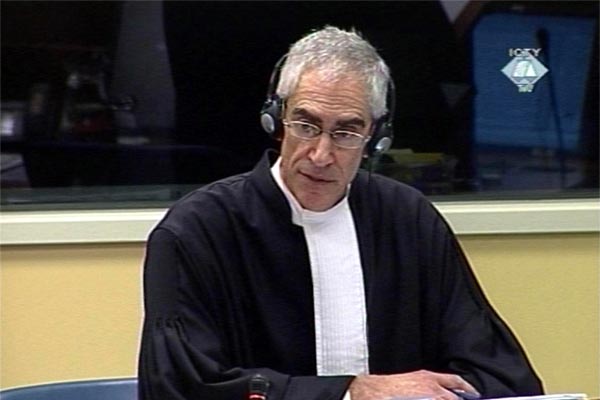Home
PROSECUTION: ENOUGH EVIDENCE AGAINST CROATIAN GENERALS
In its response to the defense motions calling for the acquittal of generals Gotovina, Cermak and Markac on all counts in the indictment for Operation Storm crimes, the prosecution contends that enough evidence was brought before the Trial Chamber to lead to a conviction of the three accused. Thirty-two names were deleted from the list of 374 victims
 Alan Tieger, vođa tima optužbe na suđenju Anti Gotovini, Ivanu Čermaku i Mladenu Markaču
Alan Tieger, vođa tima optužbe na suđenju Anti Gotovini, Ivanu Čermaku i Mladenu Markaču The prosecution contends that in the course of its case it has managed to call enough evidence for the Trial Chamber to convict Croatian generals Ante Gotovina, Ivan Cermak and Mladen Markac on all nine counts charging them with murder, persecution, deportation, forcible transfer, looting, destruction and inhumane treatment committed during and after Operation Storm in the summer of 1995. Responding to the defense motions for the acquittal of the accused, the prosecution headed by US lawyer Alain Tieger noted that it had called enough evidence about the existence of the joint criminal enterprise aimed at expelling Serbs from Krajina and about the participation of the accused in it.
Tieger mentioned the name of former Croatian president Franjo Tudjman several times, denoting him as the mastermind of the joint criminal enterprise who didn’t hide the intention to clear Krajina from Serbs in his public addresses. Tudjman’s intervention at the meeting in Brijuni on 31 July 1995 was quoted; Tudjman says it is important ‘that civilians start fleeing and then the army will follow’.
The prosecution contested the defense counsel’s claims that it failed to prove the artillery attacks on Knin were unlawful. According to the defense, that is the ‘very essence’ of the theory of the joint criminal enterprise. There is ample evidence that the objective of the shelling was to force civilians to flee, the prosecution contends. Primary targets were civilian and not military; the pattern of fire, which was intermittent over a long period, indicated that the intention was to cause fear among the population.
The unlawful shelling of Knin and other Krajina towns is just one element of the joint criminal enterprise and not its ‘very essence’ as the defense teams argued, the prosecution went on to maintain. That the Croatian political, military and police leadership intended to expel civilians, the prosecution argued, can be seen from the systematic and widespread looting and burning down of Serb houses, murder and abuse of civilians who remained, and various measures designed to prevent the return of refugees. The prosecution has deleted 32 names from the victim list because no evidence has been called about those victims. Evidence has been called for the remaining 342 names, the prosecution maintains, showing that they were killed unlawfully.
Enough evidence has been called, the prosecution believes, that General Gotovina failed to take measures to prevent crimes and punish perpetrators during and after Operation Storm, despite the fact that he undoubtedly had authority over all the units in the Split Military District. The prosecution doesn’t challenge the fact that the accused general issued orders to prevent the crimes and put a stop to them. However, ‘the repeated issuing of orders that had not been complied with’, the prosecution noted, is not enough to lead to the conclusion that Gotovina sincerely intended to prevent crimes.
As regards the claim of Ivan Cermak’s defense that Cermak was the Knin Garrison commander and not the ‘military governor’ the prosecution noted that ‘semantic explanations’ could not cover up Cermak’s real authority which was ‘huge’. According to the prosecution, there is evidence showing that Cermak had control over the army and both the military and civilian police in Knin and its surroundings, yet he failed to use it to prevent crimes and punish perpetrators. Similar evidence, the prosecution argues, has been called against General Markac although his jurisdiction was limited to the special police and crimes it allegedly perpetrated. Cermak, Markac and Gotovina contributed to creating an atmosphere of fear in Krajina aimed at expelling the remaining Serbs and preventing the Serbs who had fled from returning, the prosecution concluded.
The defense teams will deliver their rebuttal arguments tomorrow. On Wednesday, the prosecution will then once again respond to the defense in its rejoinder.
Linked Reports
- Case : Gotovina et al. - "Operation Storm"
- 2009-03-20 DEFENSE CALLS FOR ACQUITTAL OF CERMAK AND MARKAC
- 2009-03-19 DEFENSE CALLS FOR GOTOVINA’S ACQUITTAL ON ALL CHARGES
- 2009-03-05 PROSECUTION RESTS ITS CASE AT OPERATION STORM TRIAL
- 2009-03-24 DEFENSE: 'PROSECUTION'S LEGAL HODGEPODGE'
- 2009-03-25 BREAK OR END FOR OPERATION STORM TRIAL?
- 2009-04-03 MOTION FOR ACQUITTAL OF CROATIAN GENERALS REJECTED AT HALF-TIME
